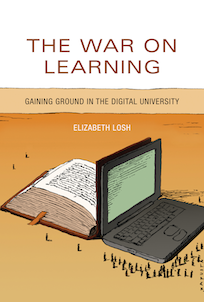By Sean Ross Meehan
Examining the current and rather cacophonous debates about the promise and peril of digital learning in higher education from the perspective of a digital rhetorician, Elizabeth Losh usefully questions the dualistic thinking that insists that new media is, alternatively, all promise or all peril. Such thinking, she understands, has yielded a war of us versus them, bits versus books, in which both extremes overvalue the innovation afforded by new media. Losh argues pointedly that “the worst reason to implement a new instructional technology is because it is new.” Critical debates about new media and learning, she reminds us, “have long rhetorical histories that go all the way back to Plato and Aristotle.” At the same time, technology cannot be dismissed as a foreign object in education since “windows in a classroom that bring in natural light are an instructional technology.”
This is not, then, a Luddite’s rant against the digitization of learning, which is not surprising since Losh directs the Culture, Art, and Technology Program at Sixth College at the University of California, San Diego. But nor is it a triumphalist manifesto extolling ubiquitous computing and what Losh identifies as the “pressures to proceduralize education.” Instead, Losh proposes a rhetorical critique of the claims, affordances, and constraints of digital media across the range of learning situations in higher education where such media have emerged in recent years. This range of digital learning situations includes the use of video and audio recording devices to deliver courses at a distance, or to “flip” the classroom by way of TED talks and other materials available on the web; the open courseware movement that reached a frenzy most recently with the emergence of MOOCs, or massive open online courses, supported by the likes of Stanford, Harvard, and MIT, whose “massive” innovation promised to disrupt the traditional campus model of intimate, residential learning; the use of plagiarism software; the distribution of mobile learning devices such as iPads to the classroom and the larger campus; and the “gamification” of courses delivered through virtual reality “serious games” such as Second Life. While her chapter on gamification was particularly engaging, and the evaluation of the impact of TED talks in higher education in need of further elaboration, all of the chapters combine to make her case for a more cooperative understanding of the effects of computational media in higher education.
Throughout this informative and evocative survey of the landscape of the digital university, Losh carries the guiding thesis that education is a process, and that many of the current efforts to reform higher education through the greater efficiencies of digital media founder when treating learning as a product. This is where Losh’s rhetorical perspective on these current debates about digital education is particularly insightful and timely. Losh critiques the rhetoric of the various claims made for the new digital learning—what, for example, does “open” really mean with regard to a MOOC such as those delivered by a for-profit corporation using proprietary software? But more insightfully, Losh understands that higher education itself is a “rhetorical enterprise” since learning is a process that “benefits from embodied performances of knowledge that respond to the exigencies of specific rhetorical situations occurring in time and space.” This understanding guides Losh in offering the hopeful conclusion that a digital classroom and a digital university can be a more pedagogically meaningful place when it better understands and enhances these rhetorically situated, live performances of knowledge. And to do so, Losh asserts, one must be a “practitioner of the learning arts” and resist the claims made by what she calls “the learning sciences.” As Losh shows, these learning arts can make use of computational media while remembering that there are additional technologies, other kinds of windows, both new and old, of relevance to the educational process.
Sean Ross Meehan (ΦBK, Princeton University, 1991) is Associate Professor of English and Director of Writing at Washington College. He is a resident member of the Theta of Maryland chapter of Phi Beta Kappa.




